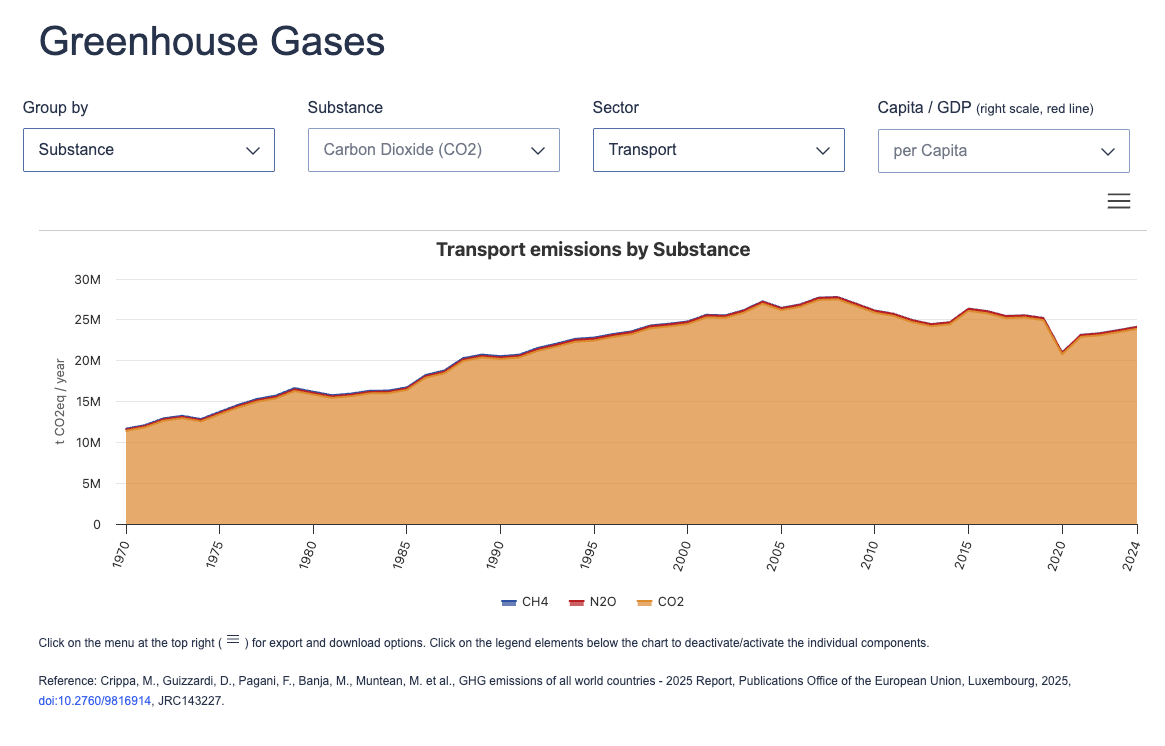ecent data on Belgium’s greenhouse gas emissions highlight a worrying reality: Belgium is no longer on track to reach climate neutrality by 2050.
According to the federal administration’s new transition barometer and Edgar emissions data, national CO₂ emissions increased by 1% in 2024 .
One sector stands out: transport, which already accounts for a quarter of Belgium’s total CO₂ emissions and continues to rise. Over the last four decades, transport emissions have increased by 18%, and they grew again by 2% in 2024 .
For companies, this reinforces a clear message: corporate mobility is becoming a strategic climate, HR and cost-efficiency issue.
📉 What the data reveal: transport is still Belgium’s weak point
- +1% national emissions in 2024, according to Edgar.
- Transport = 25% of Belgium’s CO₂ emissions.
- Electrification of the vehicle fleet is progressing too slowly to achieve climate neutrality by 2050.
- Road freight continues to grow and remains a major challenge.
- Companies still face structural barriers:
- insufficient charging infrastructure,
- mobility policies still centred on fossil-fuel cars,
- limited multimodal integration.
🏢 Why companies must act now
Corporate mobility has a direct impact on national emissions — particularly through:
- commuting,
- professional travel,
- company fleets,
- light commercial vehicles,
- and the adoption of shared mobility solutions.
For employers, the mobility transition is no longer only an environmental issue: it affects cost optimisation, employer branding, quality of life, and regulatory compliance — especially in cities like Brussels, where the Corporate Mobility Plan becomes mandatory above certain thresholds.
🛠️ Key levers to accelerate sustainable corporate mobility
Below are the most effective tools for aligning corporate mobility with climate objectives while reducing costs and improving employee experience.
1. Implementing a Mobility Budget
- Encourages employees to switch from the traditional company car to more flexible and sustainable options.
- Supports active mobility, public transport, shared mobility and zero-emission cars.
- Provides HR with a strong, future-proof benefit system.
- Delivers measurable reductions in commuting-related emissions.
2. Building a coherent internal mobility policy
- Sets clear rules for business travel and commuting.
- Promotes soft mobility, company bikes and multimodal journeys (corporate MaaS).
- Includes awareness programmes to shift mobility culture within teams.
3. Moving toward sustainable fleet management
- Reduces reliance on combustion engines and accelerates electrification.
- Introduces shared corporate vehicles to reduce the total fleet size.
- Optimises total cost of ownership through data-driven fleet decisions.
4. Accelerating fleet electrification
Belgium’s results show a concerning slowdown:
- The electrification rate is not progressing at a pace compatible with the 2050 objectives.
- Heating systems illustrate a broader trend: sales of fossil boilers rose again, and heat pumps equip less than 5% of buildings .
For companies, installing charging infrastructure is becoming essential to decarbonise their fleet and support employee adoption.
5. Expanding sustainable mobility coaching
- Helps employees choose and use alternative modes efficiently.
- Promotes cycling, public transport, multimodal commuting and car-sharing.
- Supports behaviour change through training, workshops and mobility challenges.
🌍 Reducing the corporate carbon footprint
Belgium’s carbon footprint ranges from 7 to 17 tonnes CO₂e per capita depending on methodology.
The federal report highlights that imported emissions are increasing, meaning that Belgium’s global footprint goes beyond domestic emissions alone .
Corporate mobility is one of the fastest and most concrete levers for companies to reduce their footprint — both directly and indirectly.
🚀 How Next Mobility supports organisations across Belgium
We help companies accelerate their transition through:
- Corporate mobility consulting
- Mobility budget implementation
- Fleet electrification strategies
- Employee mobility solutions
- Corporate mobility plans
- Sustainable mobility coaching
- Mobility solutions for Brussels and the rest of Belgium
Our approach is human-centred, data-driven, and focused on measurable outcomes.
🧭 Conclusion: companies can help put Belgium back on track
Transport is currently one of the main barriers to Belgium’s climate transition — but also one of the sectors with the highest potential impact.
By transforming their mobility policies, fleets and commuting strategies, companies can:
- reduce national emissions,
- improve cost efficiency,
- strengthen their HR offering,
- enhance employee wellbeing,
- contribute meaningfully to climate neutrality by 2050.
